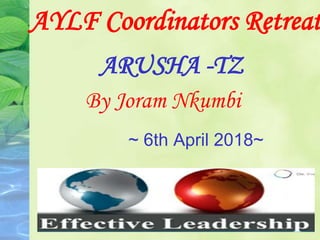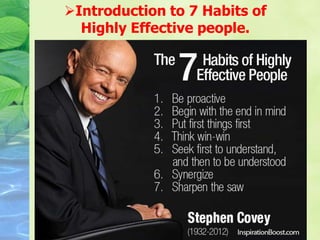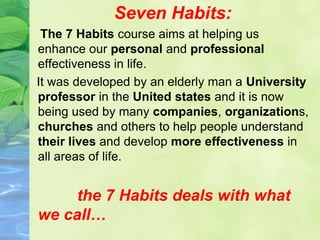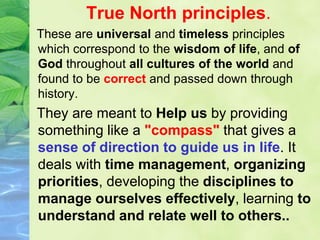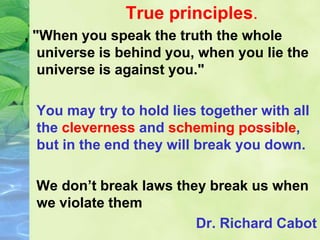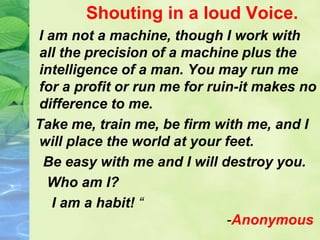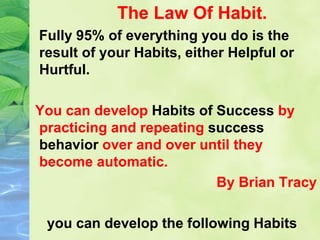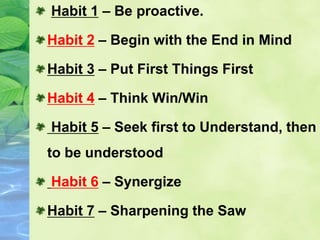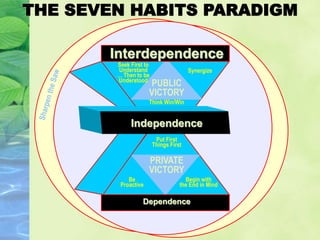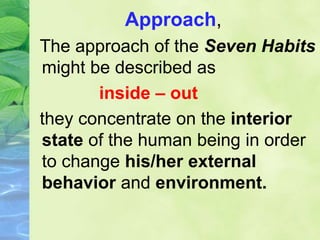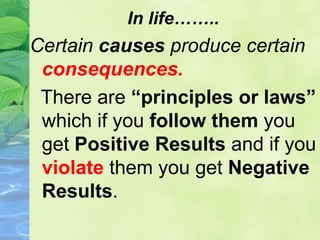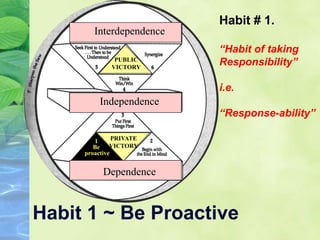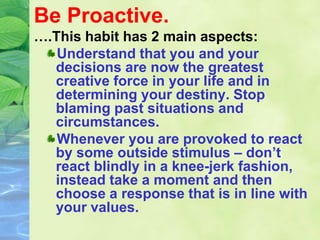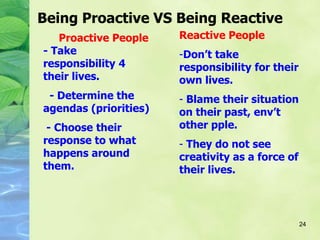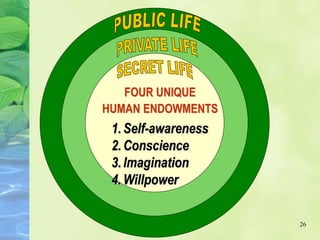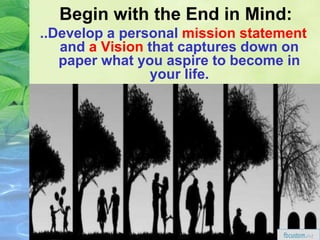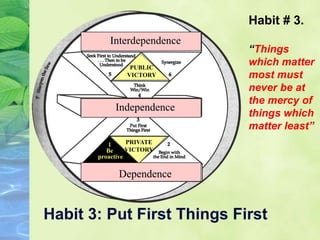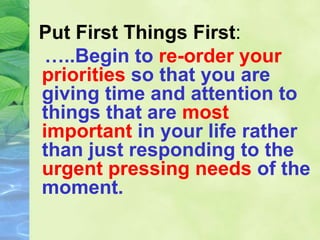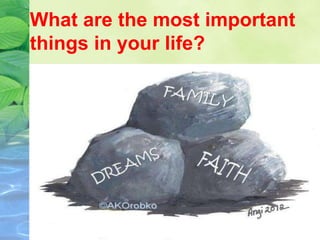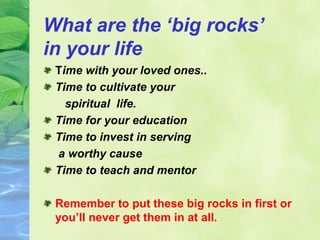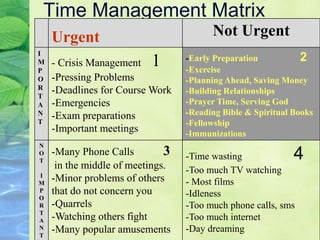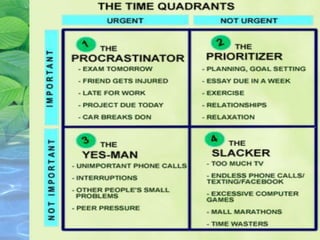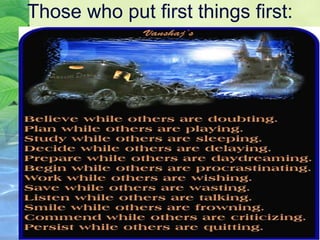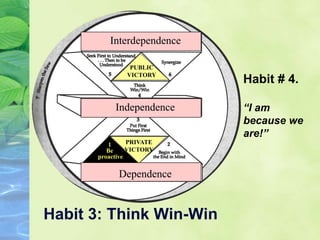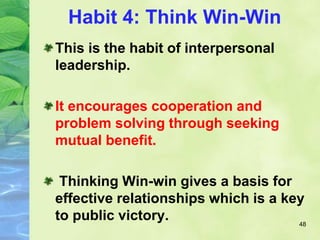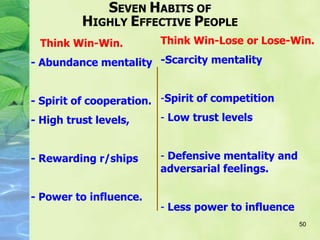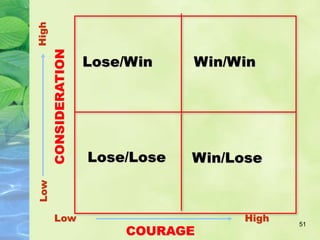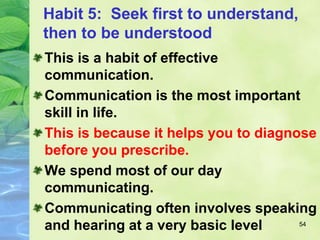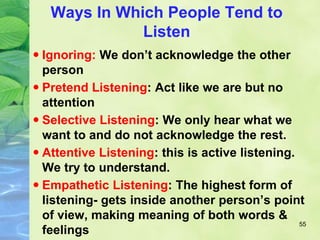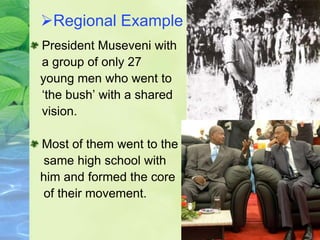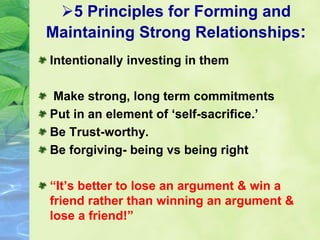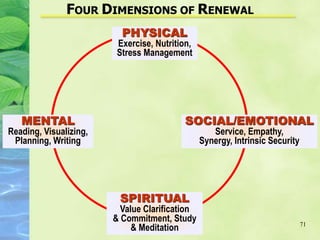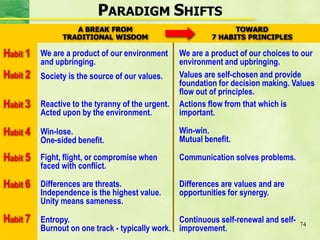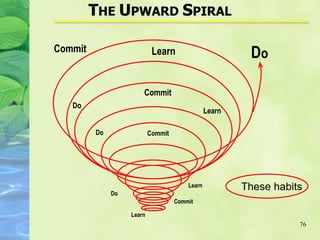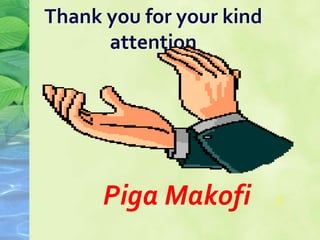The 7 Habits By Joram Nkumbi and the presentation
- 1. AYLF Coordinators Retreat ARUSHA -TZ By Joram Nkumbi ~ 6th April 2018~
- 2. A little About My Self My names are JORAM NKUMBI I have Upper Second Class Degree in Science of Mathematics and Statistics. I am Currently working with AYLF as Facilitator.. And I’m also involved in High School Leadership Development Initiative…HSLDI as the way of serving and giving back to the community.
- 3. First Degree
- 4. Introduction to 7 Habits of Highly Effective people. .
- 5. Seven Habits: The 7 Habits course aims at helping us enhance our personal and professional effectiveness in life. It was developed by an elderly man a University professor in the United states and it is now being used by many companies, organizations, churches and others to help people understand their lives and develop more effectiveness in all areas of life. the 7 Habits deals with what we call…
- 6. True North principles. These are universal and timeless principles which correspond to the wisdom of life, and of God throughout all cultures of the world and found to be correct and passed down through history. They are meant to Help us by providing something like a "compass" that gives a sense of direction to guide us in life. It deals with time management, organizing priorities, developing the disciplines to manage ourselves effectively, learning to understand and relate well to others..
- 7. True North principles. …..Understanding Principles as Laws of Human Nature which cannot be violated without ill Consequences. These true "Principles" are a part of the natural laws, the way God has made things. Like the law of Gravity: A mango will always fall toward the ground because of gravity. Likewise dishonesty in relationships will invariably lead to broken Relationships
- 8. True principles. , "When you speak the truth the whole universe is behind you, when you lie the universe is against you." You may try to hold lies together with all the cleverness and scheming possible, but in the end they will break you down. We don’t break laws they break us when we violate them Dr. Richard Cabot
- 9. There is Someone shouting on the Streets. “I am your constant companion; I am your greatest helper or heaviest burden. I will push you onward or drag you down to failure. I am completely at your command. Half the things you do- you might just as well turn over to me and I will be able to do them quickly and correctly.
- 10. ……………Still shouting. I am easily managed- you must merely be firm with me. Show me exactly how you want something done and after a few lessons I will do it automatically. I am the servant of all great men; and alas, of all failures as well. Those who are great I have made great and those who are failures I have made failures.
- 11. Shouting in a loud Voice. I am not a machine, though I work with all the precision of a machine plus the intelligence of a man. You may run me for a profit or run me for ruin-it makes no difference to me. Take me, train me, be firm with me, and I will place the world at your feet. Be easy with me and I will destroy you. Who am I? I am a habit! “ -Anonymous
- 12. Old Saying. SOW A THOUGHT, REAP AN ACTION SOW AN ACTION, REAP A HABIT SOW A HABIT, REAP A CHARACTER, SOW A CHARACTER, REAP A DESTINY. (Destiny - means what we become in life.)
- 13. The Law Of Habit. Fully 95% of everything you do is the result of your Habits, either Helpful or Hurtful. You can develop Habits of Success by practicing and repeating success behavior over and over until they become automatic. By Brian Tracy you can develop the following Habits
- 14. Habit 1 – Be proactive. Habit 2 – Begin with the End in Mind Habit 3 – Put First Things First Habit 4 – Think Win/Win Habit 5 – Seek first to Understand, then to be understood Habit 6 – Synergize Habit 7 – Sharpening the Saw
- 15. The first 3 habits : Habits 1, 2, and 3 are all geared toward developing a level of self- mastery or "Private Victory." They help someone move from a state of Dependency to Independence.
- 16. These Habits; Habits 4, 5, and 6 are all aimed at developing Teamwork with others. This is in the area of "Public Victory" These three habits move a person beyond Independence to where they can enter into "Interdependence."
- 17. Calling to mind the maturity continuum, we must remember that we cannot reach the point of interdependence without first being independent. Remember that interdependence is the healthy give and take in a relationship.
- 18. Independence Dependence Interdependence PUBLIC VICTORY PRIVATE VICTORY Seek First to Understand … Then to be Understood Synergize Think Win/Win Put First Things First Be Proactive Begin with the End in Mind THE SEVEN HABITS PARADIGM
- 19. Approach, The approach of the Seven Habits might be described as inside – out they concentrate on the interior state of the human being in order to change his/her external behavior and environment.
- 20. The 7 habits is based on what is called "the law of the harvest.” This what the scripture teaches us: "You shall reap what you sow” Galatians 6: 7-10. In other words, during our lives we will Harvest what we Plant. It is also known as the law of "cause and effect."
- 21. In life…….. Certain causes produce certain consequences. There are “principles or laws” which if you follow them you get Positive Results and if you violate them you get Negative Results.
- 22. Habit 1 ~ Be Proactive 1 Be proactive Dependence Independence Interdependence PRIVATE VICTORY PUBLIC VICTORY Habit # 1. “Habit of taking Responsibility” i.e. “Response-ability”
- 23. Be Proactive. ….This habit has 2 main aspects: Understand that you and your decisions are now the greatest creative force in your life and in determining your destiny. Stop blaming past situations and circumstances. Whenever you are provoked to react by some outside stimulus – don’t react blindly in a knee-jerk fashion, instead take a moment and then choose a response that is in line with your values.
- 24. 24 Being Proactive VS Being Reactive Proactive People - Take responsibility 4 their lives. - Determine the agendas (priorities) - Choose their response to what happens around them. Reactive People -Don’t take responsibility for their own lives. - Blame their situation on their past, env’t other pple. - They do not see creativity as a force of their lives.
- 25. 25 Being Proactive VS Being Reactive Proactive People - Choices are guided by values - Believe their life is determined by the choices they make daily - Know they can rise above these 3 factors. They cant be limited or controlled by them Reactive People -Choices are guided by feelings - Life is determined by genetics, parental upbringing & the env’t - Surrender to circumstances- victim mentality.
- 27. 27 PROACTIVE MODEL Stimulus Response Freedom to Choose Self- Awareness Imagination Conscience Independent Will
- 28. 28 BE PROACTIVE I can forgive, forget, and let go of past injustices I choose my attitudes emotions, & moods I’m the creative force of my life I’m aware that I’m responsible
- 29. Habit 2 ~ Begin with End in Mind 1 Be proactive Dependence Independence Interdependence PRIVATE VICTORY PUBLIC VICTORY Habit # 2. “Without Vision People Perish” (Prov. 29:18)
- 30. Begin with the End in Mind: ..Develop a personal mission statement and a Vision that captures down on paper what you aspire to become in your life.
- 31. Mission Statements: The Purpose part describes the end result you are trying to achieve. It often starts with a verb that indicates some change: to increase… to prevent… to enhance… to eliminate… to multiply … to support … to promote… to create… to develop The Means part describes the ‘activities’ you do. This is often incorporated with words like: by….through…
- 32. Vision It can focus in two directions: 1. Internally: imagine what your organization or self will be like in 5 years or more to come- i.e It will have the most qualified staff in 3 years It will have branches in all the regions of Tanzania by 2025 2. Externally: How the society and people you serve will be improved if you succeed in your mission. Serve people with the best serving heart 10% profit will be spent on the poor who have no financial ability
- 33. 33 Begin with the End in Mind. These people use personal vision, correct principles, and their deep sense of personal meaning to accomplish tasks in a positive and effective way. They live life based on self-chosen values and are guided by their personal mission statement. Begin with No End in Mind. These people lack personal vision and have not developed a deep sense of personal meaning and purpose. They have not paid the price to develop a mission statement and thus live life based on society’s values instead of self-chosen values. SEVEN HABITS OF HIGHLY EFFECTIVE PEOPLE
- 34. Habit 3: Put First Things First 1 Be proactive Dependence Independence Interdependence PRIVATE VICTORY PUBLIC VICTORY Habit # 3. “Things which matter most must never be at the mercy of things which matter least”
- 35. Put First Things First: …..Begin to re-order your priorities so that you are giving time and attention to things that are most important in your life rather than just responding to the urgent pressing needs of the moment.
- 37. First Things First Illustration of Jar with Stones and Sand in it. 1. The Jar represents your life 7 the amount of time you have to fill your day. 2. The sand and small stones represents all the small things that you spend your time on during the day. 3. The big stones or rocks - represent the most important things in your life.
- 38. What are the most important things in your life?
- 39. What would you do if you had…
- 40. What are the ‘big rocks’ in your life Time with your loved ones.. Time to cultivate your spiritual life. Time for your education Time to invest in serving a worthy cause Time to teach and mentor Remember to put these big rocks in first or you’ll never get them in at all.
- 41. Time Management Matrix Urgent Not Urgent I M P O R T A N T - Crisis Management 1 -Pressing Problems -Deadlines for Course Work -Emergencies -Exam preparations -Important meetings -Early Preparation 2 -Exercise -Planning Ahead, Saving Money -Building Relationships -Prayer Time, Serving God -Reading Bible & Spiritual Books -Fellowship -Immunizations N O T I M P O R T A N T -Many Phone Calls 3 in the middle of meetings. -Minor problems of others that do not concern you -Quarrels -Watching others fight -Many popular amusements -Time wasting 4 -Too much TV watching - Most films -Idleness -Too much phone calls, sms -Too much internet -Day dreaming
- 43. The 5 P’s of First Things First. Proper, Preparation, Prevents, Poor, Performance,
- 44. Those who put first things first:
- 46. The main thing is to keep the main thing the main thing- comes First!
- 47. Habit 3: Think Win-Win 1 Be proactive Dependence Independence Interdependence PRIVATE VICTORY PUBLIC VICTORY Habit # 4. “I am because we are!”
- 48. Habit 4: Think Win-Win This is the habit of interpersonal leadership. It encourages cooperation and problem solving through seeking mutual benefit. Thinking Win-win gives a basis for effective relationships which is a key to public victory. 48
- 49. Attitudes in agreements Win- Win Win- Lose Lose- Win Lose- Lose Win Win-Win or No deal
- 50. 50 Think Win-Win. - Abundance mentality - Spirit of cooperation. - High trust levels, - Rewarding r/ships - Power to influence. Think Win-Lose or Lose-Win. -Scarcity mentality -Spirit of competition - Low trust levels - Defensive mentality and adversarial feelings. - Less power to influence SEVEN HABITS OF HIGHLY EFFECTIVE PEOPLE
- 53. Seek first to understand then to be understood 1 Be proactive Dependence Independence Interdependence PRIVATE VICTORY PUBLIC VICTORY Habit # 5 A Habit of Communication
- 54. Habit 5: Seek first to understand, then to be understood 54 This is a habit of effective communication. Communication is the most important skill in life. This is because it helps you to diagnose before you prescribe. We spend most of our day communicating. Communicating often involves speaking and hearing at a very basic level
- 55. Ways In Which People Tend to Listen 55 Ignoring: We don’t acknowledge the other person Pretend Listening: Act like we are but no attention Selective Listening: We only hear what we want to and do not acknowledge the rest. Attentive Listening: this is active listening. We try to understand. Empathetic Listening: The highest form of listening- gets inside another person’s point of view, making meaning of both words & feelings
- 56. 56 Seek First to Understand, Then to Be Understood. - Listen empathetically -Caring, non- judgmental, are intent on learning the needs, interests, and concerns of others. - They are then able to courageously state their own needs and wants. Seek First to Be Understood. - Put forth their point of view based on selfish motives, - Quarrelsome - They blindly prescribe b4 diagnosing the problem. SEVEN HABITS OF HIGHLY EFFECTIVE PEOPLE
- 57. Synergy 1 Be proactive Dependence Independence Interdependence PRIVATE VICTORY PUBLIC VICTORY Habit # 6 A Habit of combined effort
- 58. Synergy means: Working together with a team enables us to do something more powerful…than the combined efforts of the individual team members working alone.
- 63. A person who knows how to Synergize thinks like this: I value other people’s strength and I partner with them. I know “two heads are better than one”. I know how to get along well with others – even those who are different than me. I seek out other people’s ideas to solve problems because I know that teaming up with others can create better solutions than any one working along. I am humble enough to include others in my vision. I am seeking to be highly effective person in furthering God’s kingdom – so it’s ok if other people share in my success.
- 64. Business World: Those who have achieved long-term success in the business world most often do so through strong partnership and joint ventures. All of us know what Bill Gates has done with Microsoft Computer Software…but not all of us realize that he has a partner, Paul Allen, who has been his closest friend and worked along side him since High School. Recently, another famous computer genius died Steve Jobs: head APPLE computers, I-Phone, I-Pad, I-Pod …when you take a closer look, you find that he co-founded the company with his best high-school friend Steve Wozinak and they worked together for 12 years to develop Apple during the beginning stages.
- 65. Regional Example President Museveni with a group of only 27 young men who went to ‘the bush’ with a shared vision. Most of them went to the same high school with him and formed the core of their movement.
- 66. 5 Principles for Forming and Maintaining Strong Relationships: Intentionally investing in them Make strong, long term commitments Put in an element of ‘self-sacrifice.’ Be Trust-worthy. Be forgiving- being vs being right “It’s better to lose an argument & win a friend rather than winning an argument & lose a friend!”
- 68. Sharpen the Saw- Habit of Self Renewal 1 Be proactive Dependence Independence Interdependence PRIVATE VICTORY PUBLIC VICTORY Habit # 7
- 69. “Sharpening the Saw” the Habit of Balance and Renewal.
- 71. 71 PHYSICAL Exercise, Nutrition, Stress Management FOUR DIMENSIONS OF RENEWAL MENTAL Reading, Visualizing, Planning, Writing SOCIAL/EMOTIONAL Service, Empathy, Synergy, Intrinsic Security SPIRITUAL Value Clarification & Commitment, Study & Meditation
- 72. Four basic needs of all human beings: "To live, to love, to learn, to leave a legacy." 1. Physical Dimension - The need to live: The need for such things as food, health, clothing, shelter and financial means. (Biological and Material) 2. Social Dimension: The need to love ---The need to relate to other people, to belong to a group, to love and be loved. Your relationships with your friends and your family. 3. Mental Dimension: The need to learn --- The need to develop and grow in our understanding of the world around us, 4. Spiritual Dimension: The need to leave a legacy. The need to have a sense of purpose to feel that we have made a contribution toward things that matter in the eternal scheme of things.
- 73. “Jesus grew in wisdom and stature , in favor with God and favor with Man.” Luke 2:52 In this passage we can see the 4 areas of life: What are they? 1. Wisdom – that is the mental aspect 2. Stature – the physical aspect 3. Favor with God – the spiritual aspect 4. Favor with man – which is the social aspect
- 74. 74 PARADIGM SHIFTS A BREAK FROM TRADITIONAL WISDOM TOWARD 7 HABITS PRINCIPLES Habit 1 We are a product of our environment and upbringing. Habit 2 Society is the source of our values. Habit 3 Reactive to the tyranny of the urgent. Acted upon by the environment. Habit 4 Win-lose. One-sided benefit. Habit 5 Fight, flight, or compromise when faced with conflict. Habit 6 Differences are threats. Independence is the highest value. Unity means sameness. Habit 7 Entropy. Burnout on one track - typically work. We are a product of our choices to our environment and upbringing. Values are self-chosen and provide foundation for decision making. Values flow out of principles. Actions flow from that which is important. Win-win. Mutual benefit. Communication solves problems. Differences are values and are opportunities for synergy. Continuous self-renewal and self- improvement.
- 75. 75 Duplicity Unkindness Violated expectations Outside stress and pressures Time wasters Interruptions Pressing problems Crises PERSONAL IMMUNE SYSTEM Live the Seven Habits Spend time in Quadrant II Follow correct principles Control own life Maintain high Emotional Bank Account with self and others Maintain reserve capacity Be resilient Empower and serve others Communicate Empathically Synergize with others using a win-win approach
- 76. 76 THE UPWARD SPIRAL These habits Learn Do Commit Learn Commit Do Do Learn Commit Learn Commit Do
- 77. The 7 Habits we introduce to you are “Natural laws” which govern human race, Do good and avoid evil. The good thing about natural laws is You can learn them You can live them You can give them The principle of giving is that “You can not give what you do not have” We don’t break laws but they break us when we violate them.
- 78. Thank you for your kind attention Piga Makofi :)
